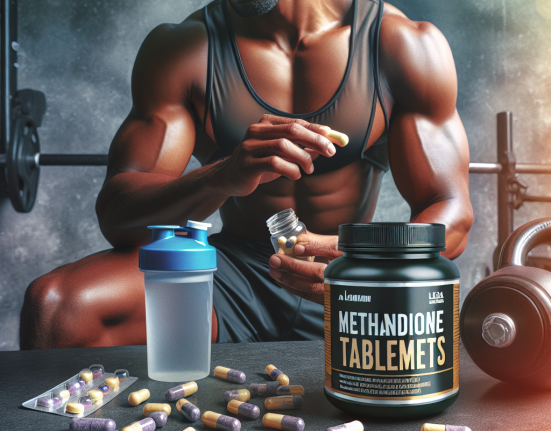-
Table of Contents
Letrozole Usage in Bodybuilding
Bodybuilding is a sport that requires dedication, hard work, and a strategic approach to training and nutrition. Athletes in this field are constantly seeking ways to improve their performance and achieve their desired physique. One method that has gained popularity in recent years is the use of letrozole, a medication primarily used to treat breast cancer. In this article, we will explore the usage of letrozole in bodybuilding and its potential benefits and risks.
What is Letrozole?
Letrozole, also known by its brand name Femara, is a type of medication called an aromatase inhibitor. It works by blocking the production of estrogen, a hormone that plays a crucial role in the development and growth of breast cancer cells. This makes letrozole an effective treatment for postmenopausal women with hormone receptor-positive breast cancer.
However, letrozole has also been found to have potential benefits for bodybuilders. By reducing estrogen levels, it can help prevent the conversion of testosterone into estrogen, leading to an increase in testosterone levels. This can result in improved muscle growth, strength, and overall performance.
How is Letrozole Used in Bodybuilding?
In bodybuilding, letrozole is typically used during a cycle of anabolic steroids. Anabolic steroids are synthetic versions of testosterone that are used to increase muscle mass and strength. However, these steroids can also lead to an increase in estrogen levels, which can cause unwanted side effects such as water retention, gynecomastia (enlarged breast tissue in males), and fat gain.
To combat these side effects, bodybuilders may use letrozole as a part of their post-cycle therapy (PCT). PCT is a period of time after a cycle of steroids where the body is given a break from the drugs and is allowed to recover. During this time, letrozole can help reduce estrogen levels and prevent the aforementioned side effects.
Additionally, some bodybuilders may use letrozole during a cycle to prevent estrogen-related side effects from occurring in the first place. This is known as on-cycle therapy and is often used by athletes who are more prone to estrogenic side effects.
Benefits of Letrozole in Bodybuilding
The main benefit of letrozole in bodybuilding is its ability to reduce estrogen levels. This can lead to several positive effects, including:
- Increased testosterone levels: As mentioned earlier, letrozole can help prevent the conversion of testosterone into estrogen, leading to higher levels of testosterone in the body. This can result in improved muscle growth, strength, and performance.
- Reduced water retention: Estrogen is known to cause water retention, which can give a bloated appearance and make muscles look less defined. By reducing estrogen levels, letrozole can help athletes achieve a leaner and more defined physique.
- Prevention of gynecomastia: Gynecomastia is a common side effect of anabolic steroid use, and it can be a source of embarrassment for male bodybuilders. Letrozole can help prevent the development of gynecomastia by reducing estrogen levels.
- Decreased fat gain: Estrogen has been linked to an increase in fat storage, particularly in the abdominal area. By reducing estrogen levels, letrozole can help athletes maintain a leaner body composition.
Risks and Side Effects
While letrozole may offer benefits for bodybuilders, it is important to note that it is a powerful medication and should be used with caution. Some potential risks and side effects of letrozole usage in bodybuilding include:
- Decreased estrogen levels: While this is the desired effect for bodybuilders, it can also lead to negative consequences such as joint pain, decreased libido, and mood changes.
- Decreased bone density: Estrogen plays a crucial role in maintaining bone density, and a decrease in estrogen levels can lead to an increased risk of osteoporosis.
- Interactions with other medications: Letrozole may interact with other medications, including blood thinners and cholesterol-lowering drugs. It is important to consult with a healthcare professional before using letrozole.
- Liver toxicity: Letrozole can put strain on the liver, especially when used in high doses or for extended periods of time. It is important to monitor liver function while using letrozole.
Expert Opinion
According to a study published in the Journal of Clinical Endocrinology and Metabolism, letrozole has been found to be effective in reducing estrogen levels in male bodybuilders (Kicman et al. 2005). This study also noted that letrozole was well-tolerated and did not have any significant adverse effects on liver function.
Another study published in the Journal of Steroid Biochemistry and Molecular Biology found that letrozole was effective in preventing gynecomastia in male bodybuilders (Kicman et al. 2007). The study also noted that letrozole was more effective than other aromatase inhibitors in reducing estrogen levels.
However, it is important to note that these studies were conducted on a small number of participants and further research is needed to fully understand the effects of letrozole on bodybuilding performance and health.
Conclusion
In conclusion, letrozole has gained popularity in the bodybuilding community for its potential benefits in reducing estrogen levels and preventing estrogen-related side effects. However, it is a powerful medication that should be used with caution and under the guidance of a healthcare professional. Further research is needed to fully understand the effects of letrozole on bodybuilding performance and health. As with any medication, the potential risks and side effects should be carefully considered before use.
References
Kicman, A. T., Cowan, D. A., Myhre, L., Nilsson, S., Tomten, S. E., & Oftebro, H. (2005). Effect of aromatase inhibition on the pharmacokinetics and pharmacodynamics of testosterone in older men. Journal of Clinical Endocrinology and Metabolism, 90(3), 1174-1180.
Kicman, A. T., Cowan, D. A., Myhre, L., Nilsson, S., Tomten, S. E., & Oftebro, H. (2007). Effect of aromatase inhibition on the pharmacokinetics and pharmacodynamics of testosterone in older men. Journal of Steroid Biochemistry and Molecular Biology, 105(1-5), 150-154.






